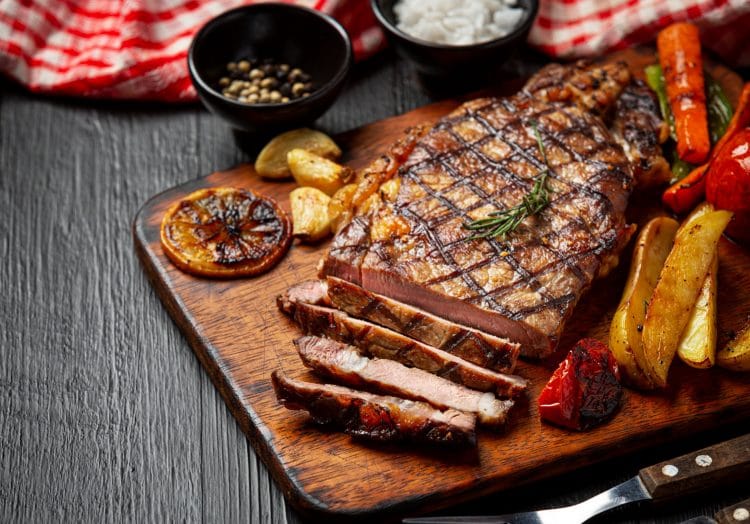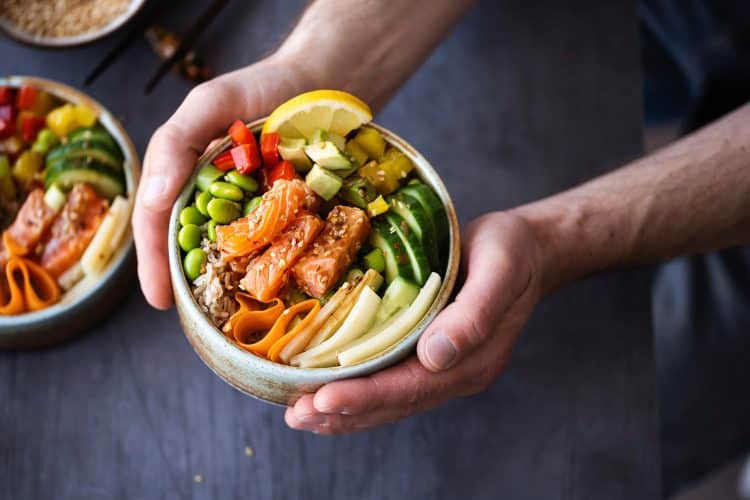Intermittent fasting has become one of the most popular practices to tackle several health-related issues. Fitness enthusiasts are turning to intermittent fasting to achieve their fitness-related goals and better overall health.
Several studies have proven that intermittent fasting (IF) can help with weight loss and also help patients manage health conditions like heart disease, type-2 diabetes, eating disorders, etc. [1] [2]. There is unprecedented growth in the number of people trying out intermittent fasting.
Uncontrollable hunger pangs are why many people shy away from trying intermittent fasting. This article will help you understand why you feel hungry during fasting. We will also suggest ways to help manage hunger while consuming fewer calories than usual.
Intermittent Fasting and Hunger Pangs

To better understand fasting and hunger, you must learn what happens in your body while you practice intermittent fasting. IF diets are time-restricted diets where a person can consume food during a predetermined window and must fast for the rest of the day.
During fasting, the body breaks down food to produce energy and maintain homeostasis. The body’s stored energy resources deplete as we go deeper into fasting. At this stage, we start feeling hungry.
Our body perceives hunger differently. Ghrelin and leptin are two hormones that govern hunger and satiety. When we feel hungry, the stomach produces ghrelin, which increases gastric motility and acid secretion. The brain signals the body to prepare for food, making you feel hungry.
Research shows that the ghrelin response is more intense and peaks around half an hour before eating when the body is anticipating food while following a fixed meal pattern [3].
During intermittent fasting, people experience hunger pangs for most of the fasting window. It makes beginners feel uncomfortable and hampers their intermittent fasting experience.
Tips To Fight Hunger While Intermittent Fasting
Now we know the body’s response to fasting and why we feel hungry. You must manage this hunger to continue intermittent fasting.
Dieticians suggest consuming certain foods and engaging in certain activities to manage hunger. This section discusses the different food items you can consume to manage hunger while intermittent fasting.
Eat Fewer Carbs & More Protein

People struggling with hunger pangs while intermittent fasting should change their diet. They must reduce carbohydrate intake and increase lean protein consumption.
Your body breaks down processed carbs quickly, leading to starvation during fasting. On the other hand, lean proteins are complex, meaning it takes longer for your body to break them down, which results in feeling satiated for longer.
Consume Healthy Fats More
Dietary fats generally have a bad rep. It is because we do not distinguish between good and bad fats. Monounsaturated and polyunsaturated fats are good fats, whereas food items containing saturated and trans fats are harmful.
Avocado, olive oil, walnuts, almonds, flax seeds, and fatty fish like salmon fall under good fats. These can help you stay satiated for longer. Additionally, monounsaturated and polyunsaturated fats can help lower LDL cholesterol levels, reduce the risk of stroke, and improve overall heart health.

Recent studies have suggested that fat consumption is not the only reason for weight gain. Carbohydrates and foods, including fast foods like sweets and snacks, significantly impact weight gain [4].
Focus on Fiber-Rich Foods
You must eat fiber-rich foods if you suffer from hunger pangs. Fruits and vegetables are rich in fiber and water, making them high-volume food items. For example, a bowl of shredded lettuce contains fewer calories than a slice of bread.
Including vegetables and fruits like carrots, cucumbers, lettuce, tomatoes, etc., in the diet helps people eat more food for fewer calories. It enables you to stay fuller for longer and avoid unpleasant hunger pangs.
Check Out: 10 Best Fiber Supplements (Review & Ranked)
Drink Sparkling Water
Since intermittent fasting is not a dry fast, you can consume water and other zero-calorie drinks. So, people who start feeling hungry while fasting can consume beverages like sparkling mineral water.

Sparkling mineral water has a refreshing taste, which can help you deal with hunger pangs since we often equate thirst with hunger. The trace minerals in sparkling mineral water are also inherently calorie-free and may help improve blood circulation, strengthen bones, etc.
Drink Tea or Coffee
Zero-calorie tea and coffee are some of the best drinks one can consume while fasting, especially for people who struggle with hunger pangs.
Tea and coffee are natural appetite suppressants. They have enzymes that help suppress hunger, delay stomach emptying, and influence appetite hormones. So, grab a cup of your favorite zero-calorie tea or coffee to recharge and beat hunger.
Stay Away From Alcohol
People who practice intermittent fasting should stay away from alcohol. If you’re fasting for over 10 to 14 hours, the pressure placed on your liver by alcohol consumption will affect the efficacy of your fast. Additionally, alcoholic drinks are not calorie-free. Hence, consuming alcohol can break your fast, make you gain weight, or make it difficult to lose weight.

Chewing Sugarless Gum
The best thing about hunger pangs induced by fasting is that they do not last long. In general, it is better to ride out these fasting-induced hunger pangs. Studies have shown that chewing sugarless gum for a prolonged period can help reduce appetite. Hence, the next time you face those pesky hunger pangs while fasting, chew your favorite sugarless gum. [5]
Replace Electrolytes
Fasting for long durations can make you lose essential electrolytes, including sodium, potassium, and magnesium. It can lead to dehydration, muscle cramping, dizziness, and hunger-like symptoms. Hence, you must maintain the right electrolytes balance by replenishing them periodically while fasting.
If you experience hunger pangs while fasting, consume zero-calorie electrolyte salts to help maintain your electrolyte levels.
Check Out: 10 Best Electrolyte Supplements (Review & Ranked)
Slow Down & Eat Mindfully
People are constantly moving at a blistering pace, developing several bad habits. One such bad practice is to eat food haphazardly. Consuming food mindfully and slowly can help reduce your appetite. Additionally, by eating slowly, we can better enjoy the food. It also aids in digestion.

Try Psyllium Husk
Psyllium husk is a revolutionary product to improve satiety. It is a low-calorie food item rich in soluble fiber. The soluble fiber gets dissolved in water and slows digestion.
It has also been found to regulate the sudden insulin spikes we experience after eating food. Studies have shown that consuming psyllium husk between meals helps lose weight and manage hunger during intermittent fasting. [6]
Supplement with Spirulina
Another great way to control hunger pangs is by including nutrient-rich supplements in your daily meals. While practicing intermittent fasting, people struggling with hunger pangs should include spirulina in their diet. Spirulina is a type of cyanobacteria often referred to as “blue-green algae.”
This superfood has several health benefits, like weight loss, speeding up the metabolism, and controlling hunger. It is available in tablet and powder form and is straightforward to include in the eating window. It also has several antioxidant and anti-inflammatory benefits and has been proven to improve your lipid profile. [7]
Tips To Control Hunger While Intermittent Fasting
Now that we have extensively discussed the food items that can help with hunger pangs while intermittent fasting, let us briefly consider what we can do to circumvent hunger better.

Start Slow
One of the biggest mistakes made by IF beginners is that they go all in at once. Starting with shorter fasts can help them better cope with hunger while fasting.
Eat Food Slowly
You must consume tiny morsels and chew food slowly. Doing this tells your brain to enjoy the food better, making you feel satiated for longer.
Keep Yourself Busy and Distracted
The fasting period can become tedious and drab; you must stay occupied while fasting by planning activities.
Create A No Food Environment
Studies have shown that food pictures and smells make us feel hungry. Hence, while practicing intermittent fasting, you must ensure that you stay away from food as much as possible. It includes avoiding food pictures on social media, avoiding food delivery apps, etc. [8]
Make Sure You’re Getting Enough Sleep
Your sleep cycle affects the endocrine system of your body. It includes the secretion and regulation of ghrelin and leptin. People with an unbalanced sleep cycle might feel much more hungry. You can rectify this issue by ensuring you sleep for 7-8 hours daily.
Start Exercising
Several studies have found that exercising can help you manage your hunger better. Working out can release acylated ghrelin. If you are fasting for weight loss, incorporating physical exercise into your regimen can accelerate your weight loss and help manage hunger. [9]
Switch Up Your Timings Through Trial & Error
Intermittent fasting affects different people differently. Hence, it is up to you to better fit it into your daily lives after trial and error and finding what works best for you.
Meditation
Incorporating meditation into your daily routine can help curb hunger pangs while fasting. It can also help you achieve a calmer mind.
FAQs
Can intermittent fasting reduce hunger?
Yes, intermittent fasting can reduce hunger and help you feel fuller for longer.
What foods should I avoid while intermittent fasting?
You must avoid food items rich in saturated and trans fats during intermittent fasting. Additionally, people must avoid alcohol and sugary beverages.
Is it better to skip breakfast or dinner while intermittent fasting?
Intermittent fasting is fairly flexible; hence, you should choose what works best for you between skipping breakfast and dinner.
Final Thoughts
Intermittent fasting can help improve health and performance. Some of the most robust health benefits come from long-term fasting practice.
Hunger is one of the main concerns people have with intermittent fasting. With the tips and suggestions mentioned in this article, you can manage the hunger associated with intermittent fasting.
Learn more about fasting
- 11 Best Intermittent Fasting Books in 2023 (Review and Ranked)
- 7 Day Water Fast: Your Journey to Rejuvenation and Wellness
- 6 Intermittent Fasting Juice Recipes: Sip Your Way to Success with These Tasty Recipes!
- Eat Stop Eat Intermittent Fasting Decoded: Master Your Metabolism & Lose Weight
- Intermittent Fasting for Weight Loss in Men — The Ultimate Guide
- Fat Loss vs. Weight Loss — Explained!
- Fruit Fasting: The Sweet Path to Wellness
- Foods To Avoid While Intermittent Fasting
References
- “Early Time-Restricted Feeding Improves 24-Hour Glucose Levels and Affects Markers of the Circadian Clock, Aging, and Autophagy in Humans – PubMed.” PubMed, 30 May 2019.
- “Early Time-Restricted Feeding Improves Insulin Sensitivity, Blood Pressure, and Oxidative Stress Even Without Weight Loss in Men With Prediabetes.” Early Time-Restricted Feeding Improves Insulin Sensitivity, Blood Pressure, and Oxidative Stress Even Without Weight Loss in Men With Prediabetes – ScienceDirect, 10 May 2018.
- https://academic.oup.com/endo/article/147/1/23/2499980. academic.oup.com/endo/article/147/1/23/2499980. Accessed 6 Jan. 2023.
- “Dietary Determinants of Energy Intake and Weight Regulation in Healthy Adults – PubMed.” PubMed, 1 Feb. 2000.
- “Effects of Chewing Gum on Short-term Appetite Regulation in Moderately Restrained Eaters – PubMed.” PubMed, 1 Oct. 2011.
- “Satiety Effects of Psyllium in Healthy Volunteers.” Satiety Effects of Psyllium in Healthy Volunteers – ScienceDirect, 7 May 2016.
- Zeinalian, Reihaneh, et al. “The Effects of Spirulina Platensis on Anthropometric Indices, Appetite, Lipid Profile and Serum Vascular Endothelial Growth Factor (VEGF) in Obese Individuals: A Randomized Double Blinded Placebo Controlled Trial.” PubMed Central (PMC), 21 Apr. 2017.
- ScienceDaily. (2012, January 19). Pictures of food create feelings of hunger. ScienceDaily. Retrieved January 6, 2023.
- Vatansever-Ozen, Serife, et al. “The Effects of Exercise on Food Intake and Hunger: Relationship With Acylated Ghrelin and Leptin.” PubMed Central (PMC), 1 June 2011.


